
Finding #Hashtags That Amplify to 6K Views

Finding #Hashtags That Amplify to 6K Views
Youtube hashtags have the power to get more viewers to your channel. Choosing the right ones at the right moment will help you grow much faster.
Knowing this, how do you know the perfect hashtags for YouTube?
The answer is simple. This guide lets you know precisely how to discover the best hashtags for YouTube. In addition, you’ll learn what tools to use and how to always find the correct tag for each video.
Best YouTube Vlog Hashtags
Hashtags are powerful features that can connect the right viewer to your content. They merge videos and viewers with similar topics and interests.
If you have a vlog on YouTube, there is a set of hashtags that work perfectly with this type of content.
This is a list that might help:
- #vloggingmylife
- #vlogginggear
- #vloggerlife
- #vloggers
- #vloglife
- #vlogger
- #vlogging
- #youtuber
- #vlogs
- #dailyvlog
- #vloggingcamera
- #vloging
- #vloggingcommunity
- #vloggerlifestyle
- #travelvlogging
- #vloggingmum
- #foodvlogging
- #vlogginglife
- #newtovlogging
- #disneyvlogging
- #vlogging101
- #vloggingsetup
- #vloggingfamily
- #vlogday
- #kidsvlogging
- #imvlogginghere
- #beautyvlogging
- #microvlogging
- #motovlogging
- #instavlogging
When using hashtags for YouTube, it’s essential to put yourself in your viewers’ shoes. So first, ask yourself what your ideal viewer is searching for.
For example, if you’re creating a video on how to cook past, think about all the ways the viewer would search for this on YouTube. A few hashtags may come to mind are #pastarecipes, #pastacooking, #tasypasta, and so on. I hope you get the idea of how hashtags work.
This may take a lot of time. However, a YouTube hashtag generator can make this process a lot quicker and even more effective.
Best Tools for YouTube Vlog Hashtags
You should know that more than these thirty hashtags will be needed to help your videos succeed. But sometimes, you will need better or more appropriate ones.
The best way to always have the perfect tags is to use a YouTube hashtags generator. It’s a tool that digs up the ideal tags for every type of video.
Here are the three best YouTube hashtag generators you can use:
1 Keyword Tool
This tool’s primary purpose may be to help with keyword research, but it has a valuable hashtag extension.
First, type in the topic of your video. For example, “vlog.” Hit Search.
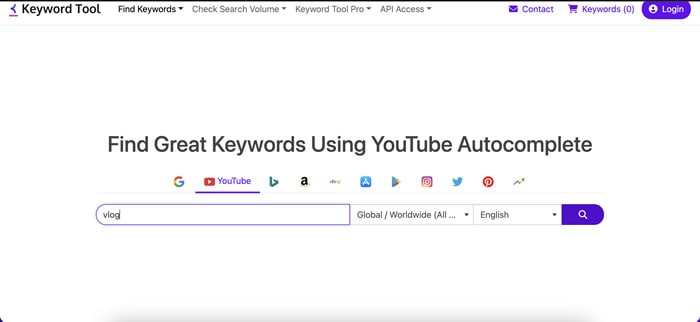
Then, select the Hashtags panel.
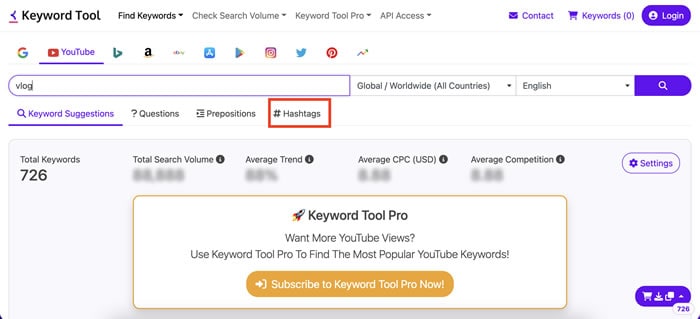
This will show you a massive list of trending hashtags you can use for your YouTube video. However, the YouTube tags it gives you will sometimes be different. For example, if you search for the same word at another time, the results may differ depending on current trends.
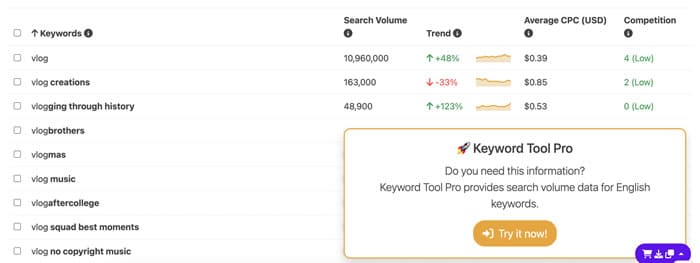
That’s all there is to it. Copy any tags you like and use them for your video. Also, you can purchase the pro version of this tool to get more detailed insights. However, the free version works just fine most of the time. The choice is yours.
2 TubeBuddy Chrome Extension
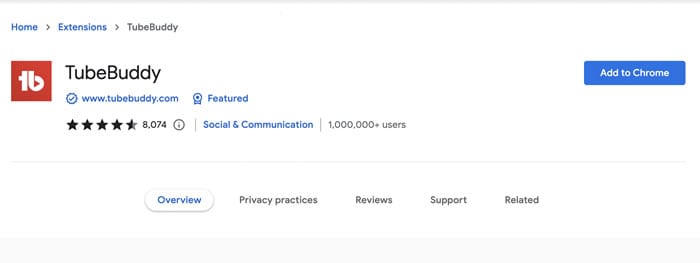
TubeBuddy is a Chrome extension that does much more for your YouTube channel than help with hashtags. It’s an optimization tool that will configure everything for better reach.
It’s also available as an Android and iOS app. As for the Chrome extension, you install it, and it integrates with YouTube.
The next time you upload a video, it will analyze it and help you process and publish it more quickly.
Additionally, TubeBuddy will also show you the best possible hashtags to use for your unique video. Over 1 million people use it. That should be proof enough that this tool truly offers something valuable.
3 VidIQ Chrome Extension
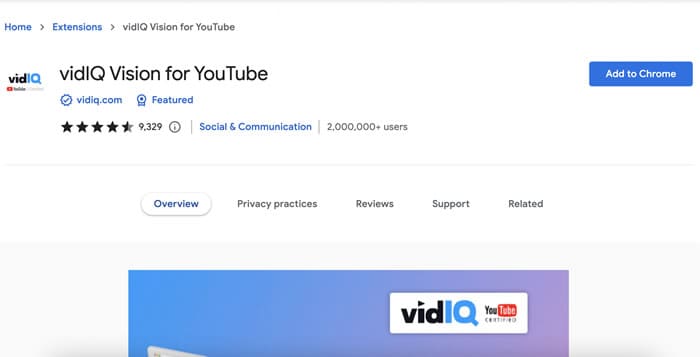
This is another Chrome extension that helps you find keywords and YouTube tags to get more views. It’s just as easy to use as the previous one. VidLQ has over 2 million users worldwide, proving its usefulness.
Plus, it has plenty of other features to help you grow your channel. For example, its Competitors Tool will give you insights into what similar channels are doing. VidLQ will also help you optimize your videos to get recommended to more viewers. As we all know, this can significantly increase your views.
It’s a great tool that can be especially beneficial for beginners. However, because of its simplicity, anyone starting on Youtube should use it. It does most of the publishing for you but teaches you how to do it yourself.
![]()
Note: If you hope to know more about YouTube keyword tools to get more views, you can read this article to increase your audience: 10 Best YouTube Keyword Tools to Get More Views
Bonus: Edit Your Vlog Videos Like A Pro With Filmora
Another way to get more YouTube views is to upload high-quality videos consistently.
By high quality, we mean no background noise, proper color grading, entertaining soundtracks, and similar. But, of course, you can be an experienced video editor to do any of this.
Filmora is an easy-to-use tool that lets you create professional videos quickly. With it, you can instantly remove background noise and search from a long list of copyright-free music. It also has a feature that edits videos automatically for you. For YouTube vlogs, this will export perfect results most of the time.
Free Download For Win 7 or later(64-bit)
Free Download For macOS 10.14 or later
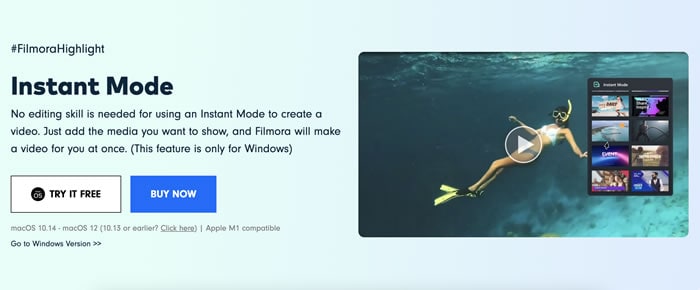
If you’re a more experienced video editor, Filmora’s also got you covered. Aside from its simple features, it also has an advanced editor. It allows you to touch up every tiny detail of your video if you feel like it.
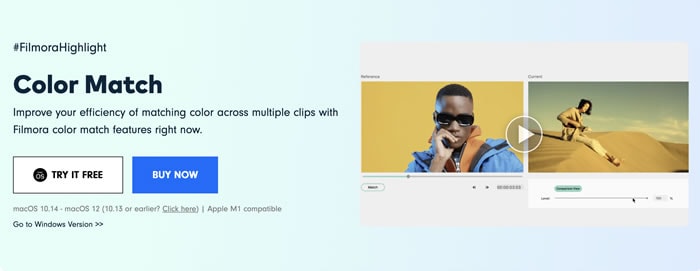
It’s an all-in-one tool that YouTube creators recommend for YouTube creators. Best of all, it has features for users of all experience levels. As a result, you won’t have to watch countless tutorials on YouTube about how to use Filmora.
For example, to help you make your vlogs more eye-catching, we have prepared the video below:
Super EASY Video Transitions for Vlogs
Conclusion
Finding the best hashtags for YouTube is an easy but also important task. It’s all the little things combined that help you get more viewers. Things like using the right keywords, thumbnails, YouTube tags, etc.
Yet, it would help if you didn’t forget the most important thing: the video itself. So, give Filmora a try and become surprised by how easy it is to create a high-quality YouTube video.
Best YouTube Vlog Hashtags
Hashtags are powerful features that can connect the right viewer to your content. They merge videos and viewers with similar topics and interests.
If you have a vlog on YouTube, there is a set of hashtags that work perfectly with this type of content.
This is a list that might help:
- #vloggingmylife
- #vlogginggear
- #vloggerlife
- #vloggers
- #vloglife
- #vlogger
- #vlogging
- #youtuber
- #vlogs
- #dailyvlog
- #vloggingcamera
- #vloging
- #vloggingcommunity
- #vloggerlifestyle
- #travelvlogging
- #vloggingmum
- #foodvlogging
- #vlogginglife
- #newtovlogging
- #disneyvlogging
- #vlogging101
- #vloggingsetup
- #vloggingfamily
- #vlogday
- #kidsvlogging
- #imvlogginghere
- #beautyvlogging
- #microvlogging
- #motovlogging
- #instavlogging
When using hashtags for YouTube, it’s essential to put yourself in your viewers’ shoes. So first, ask yourself what your ideal viewer is searching for.
For example, if you’re creating a video on how to cook past, think about all the ways the viewer would search for this on YouTube. A few hashtags may come to mind are #pastarecipes, #pastacooking, #tasypasta, and so on. I hope you get the idea of how hashtags work.
This may take a lot of time. However, a YouTube hashtag generator can make this process a lot quicker and even more effective.
Best Tools for YouTube Vlog Hashtags
You should know that more than these thirty hashtags will be needed to help your videos succeed. But sometimes, you will need better or more appropriate ones.
The best way to always have the perfect tags is to use a YouTube hashtags generator. It’s a tool that digs up the ideal tags for every type of video.
Here are the three best YouTube hashtag generators you can use:
1 Keyword Tool
This tool’s primary purpose may be to help with keyword research, but it has a valuable hashtag extension.
First, type in the topic of your video. For example, “vlog.” Hit Search.

Then, select the Hashtags panel.

This will show you a massive list of trending hashtags you can use for your YouTube video. However, the YouTube tags it gives you will sometimes be different. For example, if you search for the same word at another time, the results may differ depending on current trends.

That’s all there is to it. Copy any tags you like and use them for your video. Also, you can purchase the pro version of this tool to get more detailed insights. However, the free version works just fine most of the time. The choice is yours.
2 TubeBuddy Chrome Extension

TubeBuddy is a Chrome extension that does much more for your YouTube channel than help with hashtags. It’s an optimization tool that will configure everything for better reach.
It’s also available as an Android and iOS app. As for the Chrome extension, you install it, and it integrates with YouTube.
The next time you upload a video, it will analyze it and help you process and publish it more quickly.
Additionally, TubeBuddy will also show you the best possible hashtags to use for your unique video. Over 1 million people use it. That should be proof enough that this tool truly offers something valuable.
3 VidIQ Chrome Extension

This is another Chrome extension that helps you find keywords and YouTube tags to get more views. It’s just as easy to use as the previous one. VidLQ has over 2 million users worldwide, proving its usefulness.
Plus, it has plenty of other features to help you grow your channel. For example, its Competitors Tool will give you insights into what similar channels are doing. VidLQ will also help you optimize your videos to get recommended to more viewers. As we all know, this can significantly increase your views.
It’s a great tool that can be especially beneficial for beginners. However, because of its simplicity, anyone starting on Youtube should use it. It does most of the publishing for you but teaches you how to do it yourself.
![]()
Note: If you hope to know more about YouTube keyword tools to get more views, you can read this article to increase your audience: 10 Best YouTube Keyword Tools to Get More Views
Bonus: Edit Your Vlog Videos Like A Pro With Filmora
Another way to get more YouTube views is to upload high-quality videos consistently.
By high quality, we mean no background noise, proper color grading, entertaining soundtracks, and similar. But, of course, you can be an experienced video editor to do any of this.
Filmora is an easy-to-use tool that lets you create professional videos quickly. With it, you can instantly remove background noise and search from a long list of copyright-free music. It also has a feature that edits videos automatically for you. For YouTube vlogs, this will export perfect results most of the time.
Free Download For Win 7 or later(64-bit)
Free Download For macOS 10.14 or later

If you’re a more experienced video editor, Filmora’s also got you covered. Aside from its simple features, it also has an advanced editor. It allows you to touch up every tiny detail of your video if you feel like it.

It’s an all-in-one tool that YouTube creators recommend for YouTube creators. Best of all, it has features for users of all experience levels. As a result, you won’t have to watch countless tutorials on YouTube about how to use Filmora.
For example, to help you make your vlogs more eye-catching, we have prepared the video below:
Super EASY Video Transitions for Vlogs
Conclusion
Finding the best hashtags for YouTube is an easy but also important task. It’s all the little things combined that help you get more viewers. Things like using the right keywords, thumbnails, YouTube tags, etc.
Yet, it would help if you didn’t forget the most important thing: the video itself. So, give Filmora a try and become surprised by how easy it is to create a high-quality YouTube video.
Perfect Your Video’s Focus with Simple Blurring Techniques
How to Blur Background of Your YouTube Video

Richard Bennett
Mar 27, 2024• Proven solutions
A lot of YouTubers like to vlog in front of blurred backgrounds. Blurring the background of your YouTube video is a fast way to make it look more professional – you stand out when you are entirely in focus, and everything behind you is blurry. Plus, it is an easy way to disguise the room you are vlogging from.
Even if your set is clean, there could be things like books behind you, which will distract viewers; they will be trying to read the spines. Blurring out the background of your shot makes your video look polished and keeps people’s focus entirely on you.
- Part 1: Blur YouTube Video Background in Shooting Videos
- Part 2: Add Tilt-Shift Effects to Video in Editing
Part 1: How to Blur Background of Your YouTube Video in Shooting Videos
Blurring your background is also how you create a beautiful bokeh lighting effect. Bokeh is when you blur lights in the background of your shot, creating halo-like circles of light. By attaching a filter with a shape cut out to the camera lens, you can even generate bokeh lights in other shapes, like hearts or stars.
Aperture refers to the hole in your lens which allows light into your camera. A narrow aperture lets in less light, and a wide aperture lets in more. The wider your aperture is, the shallower your depth of field will be. Widening your aperture also helps your camera perform better in low-light situations. Widening your aperture too much under the wrong circumstances can let in too much light and result in your footage being overexposed.
Depth of Field is the area of your image that is in focus. If you have a large depth of field, then objects close to and far away from your camera will all be in focus. Only a select area will be focused and the rest will be blurred if you have a shallow depth of field.
F-Stops are the measurement of an aperture’s width. The higher your f-stop, the narrower your aperture will be. To create a blurred background or a bokeh effect, you need a wide aperture, and thus a small f-stop. F-stops are written like ‘f/1.4’. You need an f-stop of less than f/4 to blur your background, and less than f/2.8 for bokeh.
1. Blurring and Bokeh
Blurred backgrounds and bokeh are very closely related. A bokeh effect is essentially a blurred background that includes lights.
To achieve a blurred background or a bokeh effect, you need to have a shallow depth of field. That means a wide aperture and a low f-stop.
2. How to Blur your Background
Place your subject – in the case of a vlog, your subject is probably yourself – in a shallow depth of field, and they will remain sharply in focus while everything behind them is blurred.
If the subject is yourself, you might need a helper to either operate your camera or stand in for you while you set up your camera. You will need to be able to check that the place you plan to stand or sit is in focus.
To get a shallow depth of field, make sure your aperture is wide. Do this by setting a low f-stop. Ideally, your f-stop will be 2.8 or lower, but if your camera cannot go that low, then f/3 or f/4 can also work.
Creating a bokeh effect is mostly the same, except that it works best when your subject/depth of field is very close to the camera, and you have a light source off in the background. Zoom Lenses do not usually have wide enough apertures to create bokeh backgrounds.
Blur Video Background in Post-Production with Wondershare Filmora Video Editor
If you need to blur the video background after shooting, you can use some video editing software to add the bokeh effect or the tilt-off effect in post-production. Here, I will show you how to do that in Filmora.
Filmora is one of the most widely used video editing software among YouTubers. Its user-friendly interface and tutorial guide enables green-hands to start video editing quickly. Besides, you can find many free filters, effects, and elements pre-programmed, so you can use them directly without looking for presets and templates somewhere else.
1. Add Bokeh Filter to Video in Filmora
There are about 20 bokeh effects available in filters and overlays. You can find them easily by typing bokeh in the search bar in Effects.
Note: you should select Included to see all bokeh effects pre-programmed in Filmora. If you need more visual effects, just go to the Filmstock effects store.
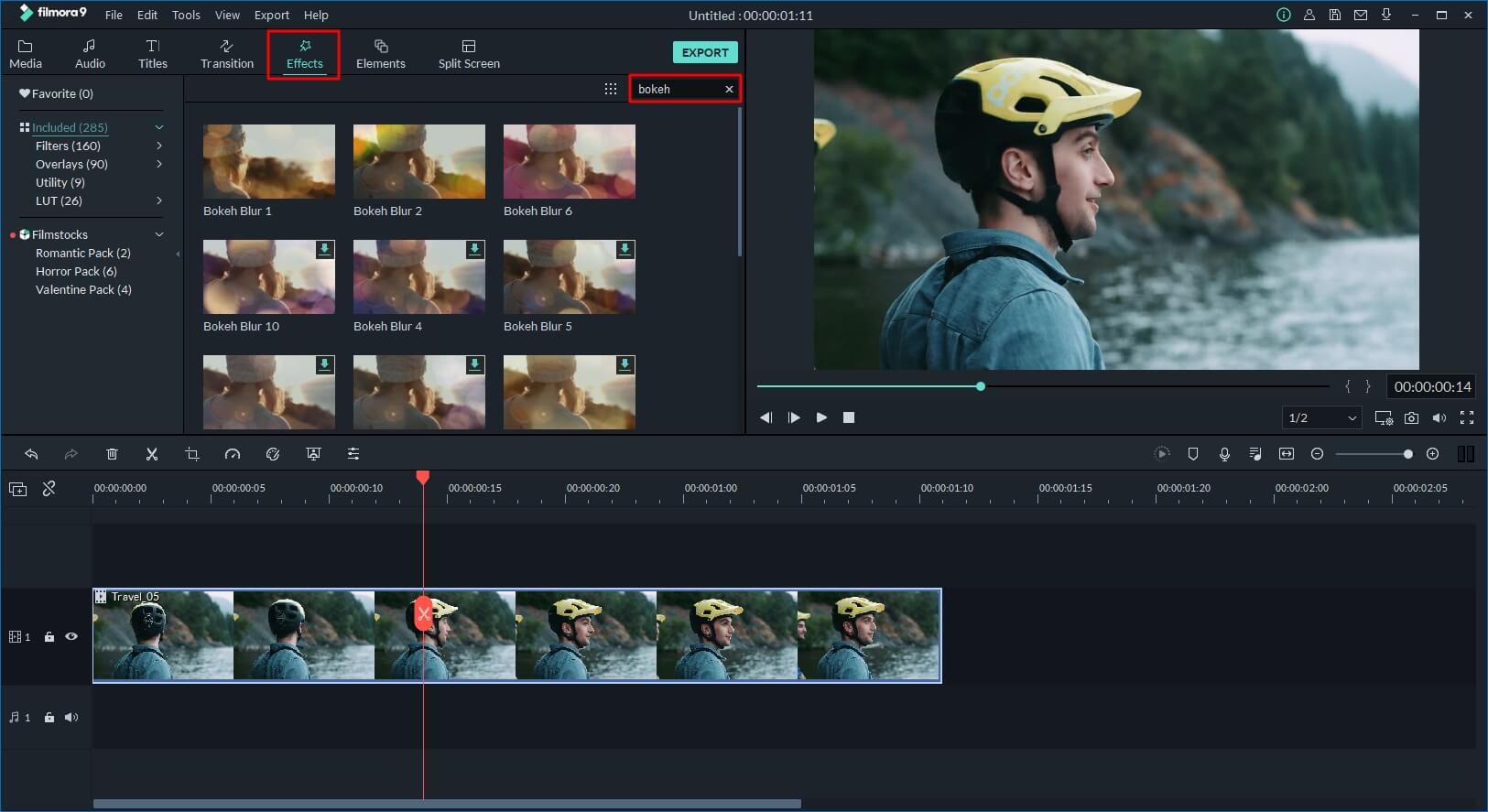
Double click the bokeh effect to preview the result, and if you find the bokeh effect fits the video, just drop it to the track above the video. And the bokeh filter or overlay will be applied to the video automatically.
2. Use Tilt-Shift Circle/Linear Effect to Blur Video Background
Filmora features two tilt effects, tilt-shift circle and tilt-shift linear, which allows you to highlight people in the video, blur, and conceal the video background.
Go to the Effects tab and then switch to the Utility menu under Included category.
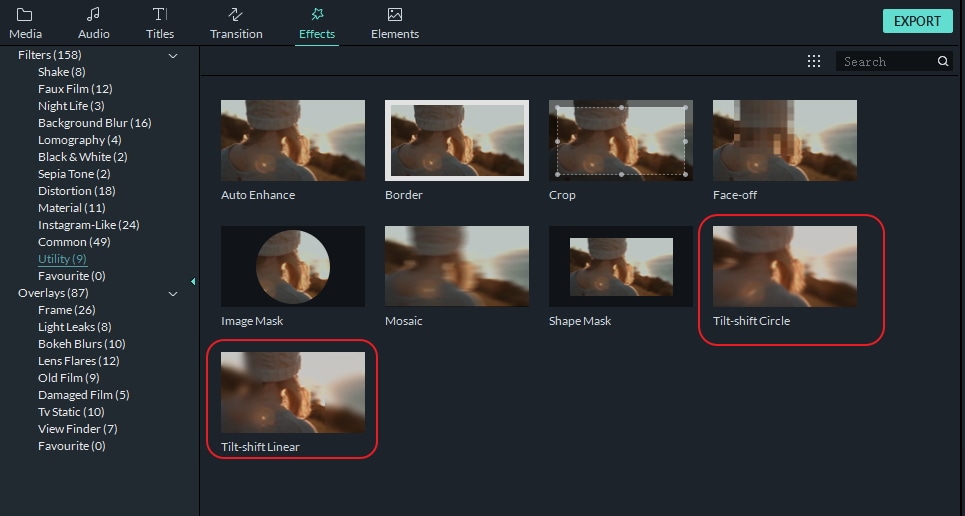
Here, I will select the Tilt-Shift Circle effect and drop it to the track above the video. Now, you can adjust the size, position, and intensity of the tilt-shift circle effect
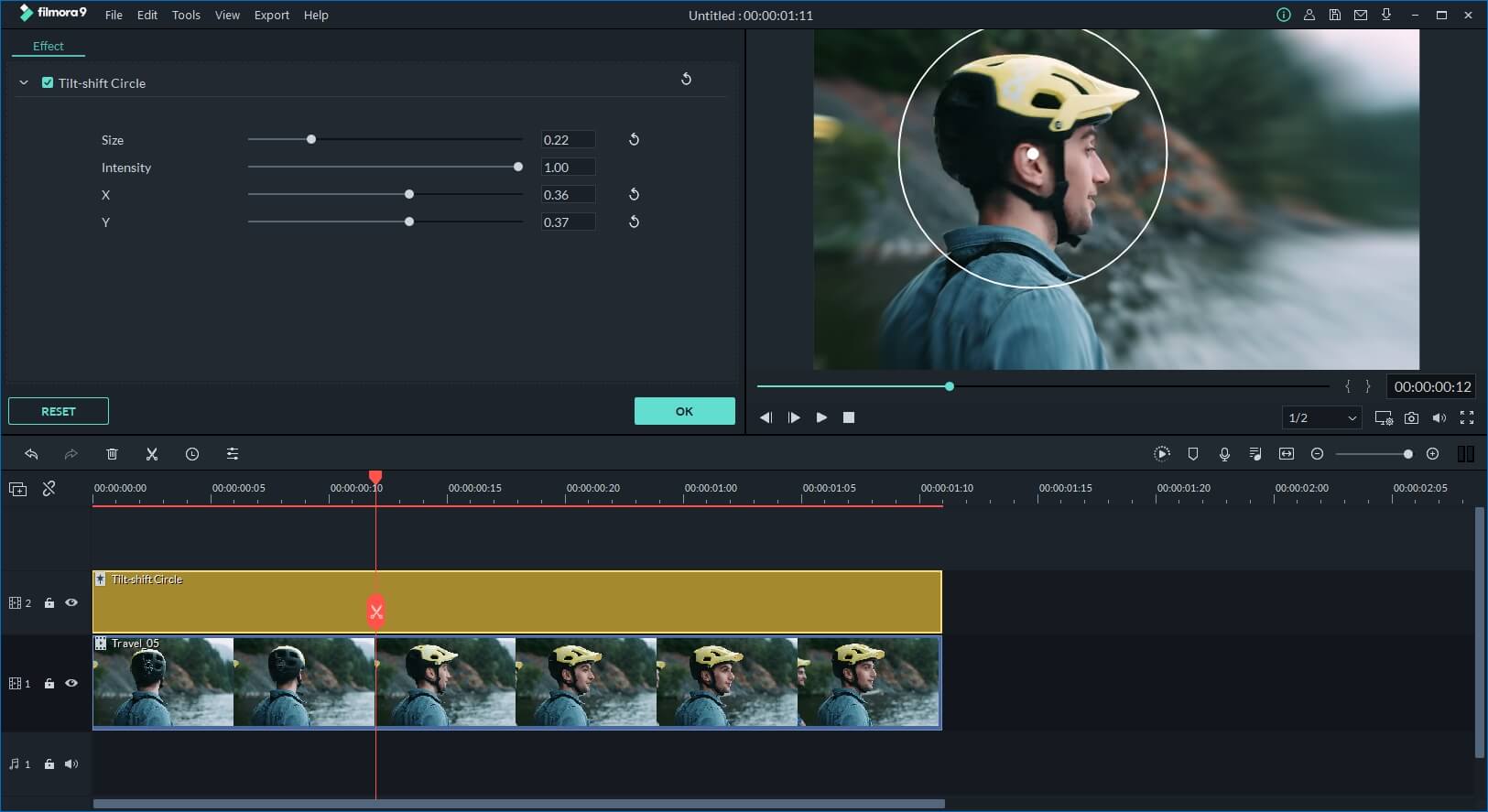
You see, the video background is blurred, and the people are highlighted. Now it’s your turn to download the Filmora video editor and try it yourself.

Richard Bennett
Richard Bennett is a writer and a lover of all things video.
Follow @Richard Bennett
Richard Bennett
Mar 27, 2024• Proven solutions
A lot of YouTubers like to vlog in front of blurred backgrounds. Blurring the background of your YouTube video is a fast way to make it look more professional – you stand out when you are entirely in focus, and everything behind you is blurry. Plus, it is an easy way to disguise the room you are vlogging from.
Even if your set is clean, there could be things like books behind you, which will distract viewers; they will be trying to read the spines. Blurring out the background of your shot makes your video look polished and keeps people’s focus entirely on you.
- Part 1: Blur YouTube Video Background in Shooting Videos
- Part 2: Add Tilt-Shift Effects to Video in Editing
Part 1: How to Blur Background of Your YouTube Video in Shooting Videos
Blurring your background is also how you create a beautiful bokeh lighting effect. Bokeh is when you blur lights in the background of your shot, creating halo-like circles of light. By attaching a filter with a shape cut out to the camera lens, you can even generate bokeh lights in other shapes, like hearts or stars.
Aperture refers to the hole in your lens which allows light into your camera. A narrow aperture lets in less light, and a wide aperture lets in more. The wider your aperture is, the shallower your depth of field will be. Widening your aperture also helps your camera perform better in low-light situations. Widening your aperture too much under the wrong circumstances can let in too much light and result in your footage being overexposed.
Depth of Field is the area of your image that is in focus. If you have a large depth of field, then objects close to and far away from your camera will all be in focus. Only a select area will be focused and the rest will be blurred if you have a shallow depth of field.
F-Stops are the measurement of an aperture’s width. The higher your f-stop, the narrower your aperture will be. To create a blurred background or a bokeh effect, you need a wide aperture, and thus a small f-stop. F-stops are written like ‘f/1.4’. You need an f-stop of less than f/4 to blur your background, and less than f/2.8 for bokeh.
1. Blurring and Bokeh
Blurred backgrounds and bokeh are very closely related. A bokeh effect is essentially a blurred background that includes lights.
To achieve a blurred background or a bokeh effect, you need to have a shallow depth of field. That means a wide aperture and a low f-stop.
2. How to Blur your Background
Place your subject – in the case of a vlog, your subject is probably yourself – in a shallow depth of field, and they will remain sharply in focus while everything behind them is blurred.
If the subject is yourself, you might need a helper to either operate your camera or stand in for you while you set up your camera. You will need to be able to check that the place you plan to stand or sit is in focus.
To get a shallow depth of field, make sure your aperture is wide. Do this by setting a low f-stop. Ideally, your f-stop will be 2.8 or lower, but if your camera cannot go that low, then f/3 or f/4 can also work.
Creating a bokeh effect is mostly the same, except that it works best when your subject/depth of field is very close to the camera, and you have a light source off in the background. Zoom Lenses do not usually have wide enough apertures to create bokeh backgrounds.
Blur Video Background in Post-Production with Wondershare Filmora Video Editor
If you need to blur the video background after shooting, you can use some video editing software to add the bokeh effect or the tilt-off effect in post-production. Here, I will show you how to do that in Filmora.
Filmora is one of the most widely used video editing software among YouTubers. Its user-friendly interface and tutorial guide enables green-hands to start video editing quickly. Besides, you can find many free filters, effects, and elements pre-programmed, so you can use them directly without looking for presets and templates somewhere else.
1. Add Bokeh Filter to Video in Filmora
There are about 20 bokeh effects available in filters and overlays. You can find them easily by typing bokeh in the search bar in Effects.
Note: you should select Included to see all bokeh effects pre-programmed in Filmora. If you need more visual effects, just go to the Filmstock effects store.

Double click the bokeh effect to preview the result, and if you find the bokeh effect fits the video, just drop it to the track above the video. And the bokeh filter or overlay will be applied to the video automatically.
2. Use Tilt-Shift Circle/Linear Effect to Blur Video Background
Filmora features two tilt effects, tilt-shift circle and tilt-shift linear, which allows you to highlight people in the video, blur, and conceal the video background.
Go to the Effects tab and then switch to the Utility menu under Included category.

Here, I will select the Tilt-Shift Circle effect and drop it to the track above the video. Now, you can adjust the size, position, and intensity of the tilt-shift circle effect

You see, the video background is blurred, and the people are highlighted. Now it’s your turn to download the Filmora video editor and try it yourself.

Richard Bennett
Richard Bennett is a writer and a lover of all things video.
Follow @Richard Bennett
Richard Bennett
Mar 27, 2024• Proven solutions
A lot of YouTubers like to vlog in front of blurred backgrounds. Blurring the background of your YouTube video is a fast way to make it look more professional – you stand out when you are entirely in focus, and everything behind you is blurry. Plus, it is an easy way to disguise the room you are vlogging from.
Even if your set is clean, there could be things like books behind you, which will distract viewers; they will be trying to read the spines. Blurring out the background of your shot makes your video look polished and keeps people’s focus entirely on you.
- Part 1: Blur YouTube Video Background in Shooting Videos
- Part 2: Add Tilt-Shift Effects to Video in Editing
Part 1: How to Blur Background of Your YouTube Video in Shooting Videos
Blurring your background is also how you create a beautiful bokeh lighting effect. Bokeh is when you blur lights in the background of your shot, creating halo-like circles of light. By attaching a filter with a shape cut out to the camera lens, you can even generate bokeh lights in other shapes, like hearts or stars.
Aperture refers to the hole in your lens which allows light into your camera. A narrow aperture lets in less light, and a wide aperture lets in more. The wider your aperture is, the shallower your depth of field will be. Widening your aperture also helps your camera perform better in low-light situations. Widening your aperture too much under the wrong circumstances can let in too much light and result in your footage being overexposed.
Depth of Field is the area of your image that is in focus. If you have a large depth of field, then objects close to and far away from your camera will all be in focus. Only a select area will be focused and the rest will be blurred if you have a shallow depth of field.
F-Stops are the measurement of an aperture’s width. The higher your f-stop, the narrower your aperture will be. To create a blurred background or a bokeh effect, you need a wide aperture, and thus a small f-stop. F-stops are written like ‘f/1.4’. You need an f-stop of less than f/4 to blur your background, and less than f/2.8 for bokeh.
1. Blurring and Bokeh
Blurred backgrounds and bokeh are very closely related. A bokeh effect is essentially a blurred background that includes lights.
To achieve a blurred background or a bokeh effect, you need to have a shallow depth of field. That means a wide aperture and a low f-stop.
2. How to Blur your Background
Place your subject – in the case of a vlog, your subject is probably yourself – in a shallow depth of field, and they will remain sharply in focus while everything behind them is blurred.
If the subject is yourself, you might need a helper to either operate your camera or stand in for you while you set up your camera. You will need to be able to check that the place you plan to stand or sit is in focus.
To get a shallow depth of field, make sure your aperture is wide. Do this by setting a low f-stop. Ideally, your f-stop will be 2.8 or lower, but if your camera cannot go that low, then f/3 or f/4 can also work.
Creating a bokeh effect is mostly the same, except that it works best when your subject/depth of field is very close to the camera, and you have a light source off in the background. Zoom Lenses do not usually have wide enough apertures to create bokeh backgrounds.
Blur Video Background in Post-Production with Wondershare Filmora Video Editor
If you need to blur the video background after shooting, you can use some video editing software to add the bokeh effect or the tilt-off effect in post-production. Here, I will show you how to do that in Filmora.
Filmora is one of the most widely used video editing software among YouTubers. Its user-friendly interface and tutorial guide enables green-hands to start video editing quickly. Besides, you can find many free filters, effects, and elements pre-programmed, so you can use them directly without looking for presets and templates somewhere else.
1. Add Bokeh Filter to Video in Filmora
There are about 20 bokeh effects available in filters and overlays. You can find them easily by typing bokeh in the search bar in Effects.
Note: you should select Included to see all bokeh effects pre-programmed in Filmora. If you need more visual effects, just go to the Filmstock effects store.

Double click the bokeh effect to preview the result, and if you find the bokeh effect fits the video, just drop it to the track above the video. And the bokeh filter or overlay will be applied to the video automatically.
2. Use Tilt-Shift Circle/Linear Effect to Blur Video Background
Filmora features two tilt effects, tilt-shift circle and tilt-shift linear, which allows you to highlight people in the video, blur, and conceal the video background.
Go to the Effects tab and then switch to the Utility menu under Included category.

Here, I will select the Tilt-Shift Circle effect and drop it to the track above the video. Now, you can adjust the size, position, and intensity of the tilt-shift circle effect

You see, the video background is blurred, and the people are highlighted. Now it’s your turn to download the Filmora video editor and try it yourself.

Richard Bennett
Richard Bennett is a writer and a lover of all things video.
Follow @Richard Bennett
Richard Bennett
Mar 27, 2024• Proven solutions
A lot of YouTubers like to vlog in front of blurred backgrounds. Blurring the background of your YouTube video is a fast way to make it look more professional – you stand out when you are entirely in focus, and everything behind you is blurry. Plus, it is an easy way to disguise the room you are vlogging from.
Even if your set is clean, there could be things like books behind you, which will distract viewers; they will be trying to read the spines. Blurring out the background of your shot makes your video look polished and keeps people’s focus entirely on you.
- Part 1: Blur YouTube Video Background in Shooting Videos
- Part 2: Add Tilt-Shift Effects to Video in Editing
Part 1: How to Blur Background of Your YouTube Video in Shooting Videos
Blurring your background is also how you create a beautiful bokeh lighting effect. Bokeh is when you blur lights in the background of your shot, creating halo-like circles of light. By attaching a filter with a shape cut out to the camera lens, you can even generate bokeh lights in other shapes, like hearts or stars.
Aperture refers to the hole in your lens which allows light into your camera. A narrow aperture lets in less light, and a wide aperture lets in more. The wider your aperture is, the shallower your depth of field will be. Widening your aperture also helps your camera perform better in low-light situations. Widening your aperture too much under the wrong circumstances can let in too much light and result in your footage being overexposed.
Depth of Field is the area of your image that is in focus. If you have a large depth of field, then objects close to and far away from your camera will all be in focus. Only a select area will be focused and the rest will be blurred if you have a shallow depth of field.
F-Stops are the measurement of an aperture’s width. The higher your f-stop, the narrower your aperture will be. To create a blurred background or a bokeh effect, you need a wide aperture, and thus a small f-stop. F-stops are written like ‘f/1.4’. You need an f-stop of less than f/4 to blur your background, and less than f/2.8 for bokeh.
1. Blurring and Bokeh
Blurred backgrounds and bokeh are very closely related. A bokeh effect is essentially a blurred background that includes lights.
To achieve a blurred background or a bokeh effect, you need to have a shallow depth of field. That means a wide aperture and a low f-stop.
2. How to Blur your Background
Place your subject – in the case of a vlog, your subject is probably yourself – in a shallow depth of field, and they will remain sharply in focus while everything behind them is blurred.
If the subject is yourself, you might need a helper to either operate your camera or stand in for you while you set up your camera. You will need to be able to check that the place you plan to stand or sit is in focus.
To get a shallow depth of field, make sure your aperture is wide. Do this by setting a low f-stop. Ideally, your f-stop will be 2.8 or lower, but if your camera cannot go that low, then f/3 or f/4 can also work.
Creating a bokeh effect is mostly the same, except that it works best when your subject/depth of field is very close to the camera, and you have a light source off in the background. Zoom Lenses do not usually have wide enough apertures to create bokeh backgrounds.
Blur Video Background in Post-Production with Wondershare Filmora Video Editor
If you need to blur the video background after shooting, you can use some video editing software to add the bokeh effect or the tilt-off effect in post-production. Here, I will show you how to do that in Filmora.
Filmora is one of the most widely used video editing software among YouTubers. Its user-friendly interface and tutorial guide enables green-hands to start video editing quickly. Besides, you can find many free filters, effects, and elements pre-programmed, so you can use them directly without looking for presets and templates somewhere else.
1. Add Bokeh Filter to Video in Filmora
There are about 20 bokeh effects available in filters and overlays. You can find them easily by typing bokeh in the search bar in Effects.
Note: you should select Included to see all bokeh effects pre-programmed in Filmora. If you need more visual effects, just go to the Filmstock effects store.

Double click the bokeh effect to preview the result, and if you find the bokeh effect fits the video, just drop it to the track above the video. And the bokeh filter or overlay will be applied to the video automatically.
2. Use Tilt-Shift Circle/Linear Effect to Blur Video Background
Filmora features two tilt effects, tilt-shift circle and tilt-shift linear, which allows you to highlight people in the video, blur, and conceal the video background.
Go to the Effects tab and then switch to the Utility menu under Included category.

Here, I will select the Tilt-Shift Circle effect and drop it to the track above the video. Now, you can adjust the size, position, and intensity of the tilt-shift circle effect

You see, the video background is blurred, and the people are highlighted. Now it’s your turn to download the Filmora video editor and try it yourself.

Richard Bennett
Richard Bennett is a writer and a lover of all things video.
Follow @Richard Bennett
Also read:
- [New] Convert Your YouTube Files Effortlessly to WebM
- [Updated] 2024 Approved Essential Mac Apps Screen Recording Made Simple
- 2024 Approved Captivate Crowds Secrets to Screen Collaboration via Social Media
- 2024 Approved Pixellation Perfection Windows & Mac's Photo to Animation Powerhouse
- Complete guide for recovering messages files on Tecno Spark 20C
- Elite GPodC Podcast Recommendations
- How To Transfer WhatsApp From iPhone XR to other iPhone 15 Pro devices? | Dr.fone
- In 2024, Elite Recording Devices for Livestream Producers
- In 2024, LG Virtual Reality Breakthrough An In-Depth Analysis
- Master the Art of Video Cuts Essential Tools for Mac Users
- Mix Mastery Choosing Top DJ Videos for Events
- PC Players Guide: Solving Call of Duty: Warzone Connection Problems During Online Battles
- Simplicity in Code Constructing a Streamlined YouTube Sign-Up
- Step-by-Step Guide to Installing Sound Blaster Z Drivers on Windows 10 PCs
- Unova Stone Pokémon Go Evolution List and How Catch Them For Poco M6 Pro 5G | Dr.fone
- Title: Finding #Hashtags That Amplify to 6K Views
- Author: Steven
- Created at : 2025-01-20 16:05:00
- Updated at : 2025-01-22 16:01:40
- Link: https://youtube-clips.techidaily.com/finding-hashtags-that-amplify-to-6k-views/
- License: This work is licensed under CC BY-NC-SA 4.0.


